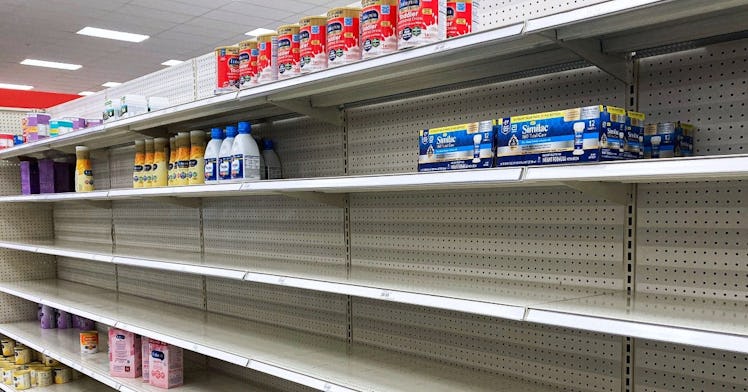Everything the Government Is Doing to Fix the Formula Shortage — And What it Means for You
The formula shortage is deeply ongoing.

After long months where parents have been left to deal with an ever-worsening national baby formula shortage by scouring stores for hours in all directions, utilizing Facebook groups to find the scoop on formula, and struggling to figure out how to feed their infants, the U.S. government has finally stepped in to help. This week, both President Biden and the House of Representatives addressed the formula shortage and passed a handful of measures intended to ease the crisis and get vital infant foods back on shelves and into homes that desperately need them.
While Abbott, the formula manufacturer whose plant shut down earlier this year due to potential contamination concerns and contributed to the shortage on a supply chain that was already not great due to COVID-19, has been authorized to reopen, they won’t be able to get formula back on shelves for many weeks after reopening. Meanwhile, the immediately present shortage will continue. Here’s what the U.S. government is doing to address it.
President Biden Invoked the Defense Production Act
On May 18th, President Biden invoked the Defense Production Act — a Korean War-era power that allows the sitting president to increase the production of supplies and materials from U.S manufacturers in cases of emergency. (It was authorized during the COVID-19 pandemic in order to shore up medical supplies and more.)
The DPA will give the federal government more control over formula ingredient manufacture and shipping, ensuring that necessary ingredients make it to formula manufacturing facilities with all possible speed. When asked last week why it took so long for his administration to address the crisis, which has been looming and increasing since January, the President said they “moved as quickly as a problem became apparent to us,” adding, “If we’d been better mind readers, I guess we could have [responded more quickly].”
In a video posted to Twitter announcing his decision to invoke the DPA, Biden said, “I know parents all across the country are worried about finding enough infant formula to feed their babies — as a parent and as a grandparent, I know just how stressful that is.” He added that his administration will “do everything possible to ensure there’s enough safe baby formula and that it’s quickly reaching families that need it the most,” though he noted it might take weeks.
Biden Announced “Operation Fly Formula”
In addition to the Defense Production Act, President Biden announced the creation of a new initiative, Operation Fly Formula. The aim of Operation Fly Formula will be to import safe formulas from overseas. The operation will appropriate commercial cargo planes under contract with the Department of Defense to directly import formula that meets U.S. standards, bypassing the typical shipping routes and shortening delivery time.
In a letter to the Secretaries of Agriculture and Health and Human Services announcing Operation Fly Formula, Biden wrote, “I request that you work expeditiously to identify any and all avenues to speed the importation of safe infant formula into the United States and onto store shelves. I further request that over the next week you work with the Department of Defense to utilize contracted aircraft to accelerate the arrival of infant formula into the United States that meets our Government’s health and safety standards. This will ensure that we are using every available tool to get American families swifter access to the infant formula they need.”
The House Passed The Infant Formula Supplemental Appropriations Act
The same day President Biden invoked the DPA, the House of Representatives approved an emergency spending bill that would funnel $28 million to the Food and Drug Administration to pay for additional staff to inspect formula, both U.S. and imported. Funds from the Infant Formal Supplemental Appropriations Act would also be used to help prevent the fraudulent and unsafe formulas from entering the U.S. market and improve record-keeping and data collection in the formula industry.
The bill passed 231 to 192, predominantly along party lines, with the majority of Republicans voting against providing funding to ensure that babies can get formula and be fed faster. The bill will move on to the Senate, where voting will also likely fall along party lines. If the Senate approves the bill, it will move to the President’s desk to be signed into law.
The House Passed the Access to Baby Formula Act
Members of the House also voted on and passed the Access to Baby Formula Act, which addresses the need of vulnerable communities to have access to baby formula. The ABF will increase the type or brand of formula allowed to be purchased with WIC, giving marginalized communities more choice and more options when purchasing food for infants.
Currently, according to the WIC website, “WIC state agencies are required by law to have competitively bid infant formula rebate contracts with infant formula manufacturers. This means WIC state agencies agree to provide one brand of infant formula, and in return, the manufacturer gives the state agency a rebate for each can of infant formula purchased by WIC participants.”
The ABF will temporarily remove certain restrictions placed on retailers and WIC-dependent families to ensure they have better access to infant formula for their babies.